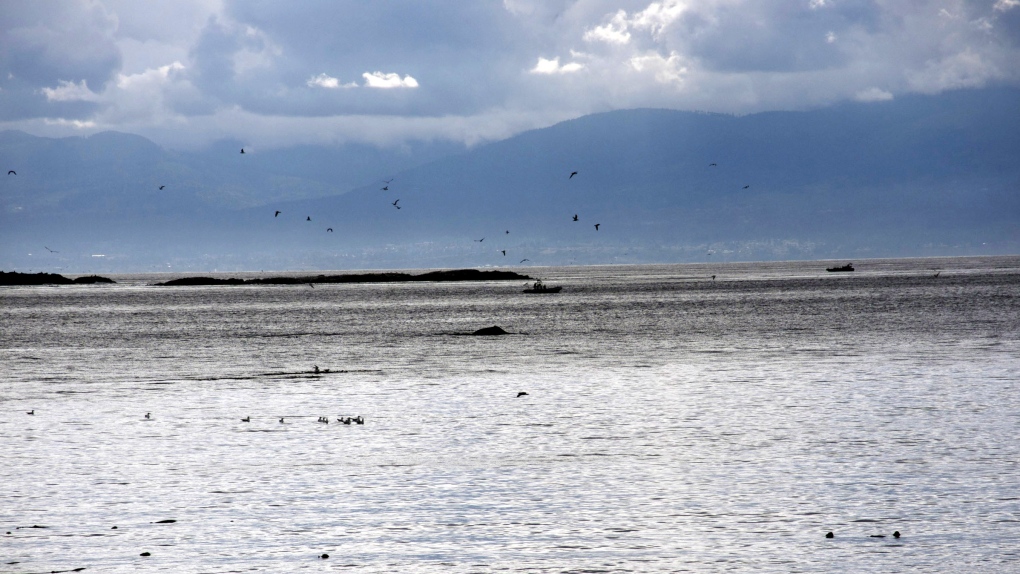Navy warns of demolition training south of Victoria
 A baleen whale breaches the water surface inside the two-kilometre radius of the Bentinck Island demolition range while a navy sentry boat tracks the whale’s position. (Royal Canadian Navy)
A baleen whale breaches the water surface inside the two-kilometre radius of the Bentinck Island demolition range while a navy sentry boat tracks the whale’s position. (Royal Canadian Navy)
The Canadian military is warning South Island residents of upcoming demolition training south of Victoria next week.
The demolition training will take place on Bentick Island, located southwest of Victoria near Rocky Point, between 9 a.m. and 4 p.m. from March 22 to March 24.
"The site is used as an above-water terrestrial demolition range by the Canadian Armed Forces," said the Department of National Defence (DND) in a release Wednesday.
"Training events are critical to ensure military members gain core skills and maintain operational readiness."
The DND says nearby residents likely won't hear the training, unless "atmospheric conditions" allow sound to travel far distances during the training days.
The military says the training exercises have strict guidelines in place to limit acoustic impacts on marine animals.
A third-party marine mammal observer will be present during next week's training and will greenlight the exercises once they're certain whales are clear of the area.
"Events are delayed if whales are observed in or transiting towards the range, and activities do not re-commence until the Marine Mammal Observer provides the all-clear," said the DND.
The military is reminding residents that it's illegal to enter training zones.
Earlier this year, the military was cleared to resume weapons training along a section of southern Vancouver Island after a three-year study found that existing guidelines were sufficient to mitigate the harmful effects of sea-surface and aerial gunnery on marine wildlife.
The 30-kilometre stretch of coastline in the Strait of Juan de Fuca is used by both the Canadian and U.S. militaries, as well as the U.S. Coast Guard, for training.
"As the [area] is located within southern resident killer whale critical habitat and within key foraging areas used by this population during the summer months, potential effects to this population are of particular importance," wrote engineering firm Golder Associates, which was contracted to perform the study, in its final report to the federal government.
"Modelling results for all scenarios indicate that small arms noise will not exceed the underwater disturbance threshold for any marine mammal species."
With files from CTV News Vancouver Island's Todd Coyne.
CTVNews.ca Top Stories

'They needed people inside Air Canada:' Police announce arrests in Pearson gold heist
Police say one former and one current employee of Air Canada are among the nine suspects that are facing charges in connection with the gold heist at Pearson International Airport last year.
House admonishes ArriveCan contractor in rare parliamentary show of power
MPs enacted an extraordinary, rarely used parliamentary power on Wednesday, summonsing an ArriveCan contractor to appear before the House of Commons where he was admonished publicly and forced to provide answers to the questions MPs said he'd previously evaded.
Leafs star Auston Matthews finishes season with 69 goals
Auston Matthews won't be joining the NHL's 70-goal club this season.
Trump lawyers say Stormy Daniels refused subpoena outside a Brooklyn bar, papers left 'at her feet'
Donald Trump's legal team says it tried serving Stormy Daniels a subpoena as she arrived for an event at a bar in Brooklyn last month, but the porn actor, who is expected to be a witness at the former president's criminal trial, refused to take it and walked away.
Why drivers in Eastern Canada could see big gas price spikes, and other Canadians won't
Drivers in Eastern Canada face a big increase in gas prices because of various factors, especially the higher cost of the summer blend, industry analysts say.
Doug Ford calls on Ontario Speaker to reverse Queen's Park keffiyeh ban
Ontario Premier Doug Ford is calling on Speaker Ted Arnott to reverse a ban on keffiyehs at Queen's Park, describing the move as “needlessly” divisive.
'A living nightmare': Winnipeg woman sentenced following campaign of harassment against man after online date
A Winnipeg woman was sentenced to house arrest after a single date with a man she met online culminated in her harassing him for years, and spurred false allegations which resulted in the innocent man being arrested three times.
Woman who pressured boyfriend to kill his ex in 2000s granted absences from prison
A woman who pressured her boyfriend into killing his teenage ex more than a decade ago will be allowed to leave prison for weeks at a time.
Customers disappointed after email listing $60K Tim Hortons prize sent in error
Several Tim Horton’s customers are feeling great disappointment after being told by the company that an email stating they won a boat worth nearly $60,000 was sent in error.

































